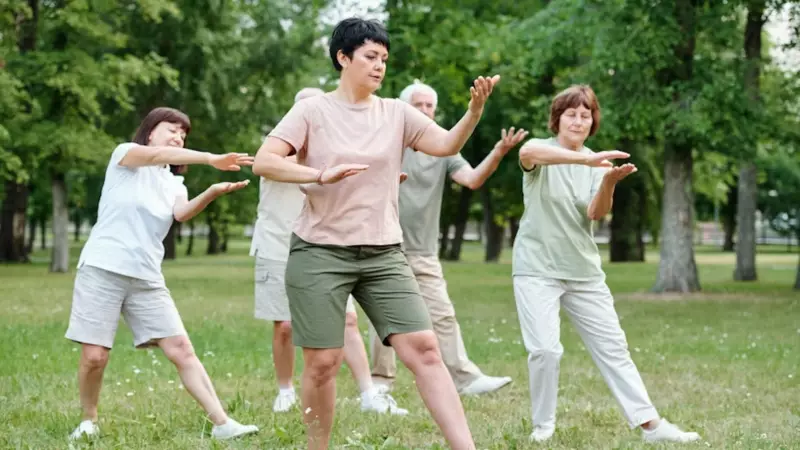
In today's fast-paced world, many Indians are searching for holistic wellness practices that address both physical and mental health. Among the ancient practices gaining modern relevance, Tai Chi stands out as a gentle yet powerful exercise form that promises numerous health benefits. But is this Chinese martial art truly worth your time and effort?
What Exactly Is Tai Chi?
Tai Chi, also known as Tai Chi Chuan, is an ancient Chinese martial art that has evolved into a popular form of mind-body exercise. Unlike intense workout routines that dominate fitness trends, Tai Chi emphasizes slow, deliberate movements combined with deep breathing and mental focus. The practice originated centuries ago as a martial art but has since transformed into what many call 'meditation in motion'.
The fundamental principles of Tai Chi involve continuous, flowing movements that are performed with precision and awareness. Practitioners move through a series of postures named after animal actions or martial arts moves, all while maintaining proper body alignment and controlled breathing. This combination creates a unique exercise experience that differs significantly from conventional workouts.
Scientific Evidence Supporting Tai Chi Benefits
Multiple studies have confirmed what practitioners have known for centuries: Tai Chi delivers substantial health benefits. Research published in reputable medical journals shows that regular practice can significantly improve balance and reduce fall risk among older adults. This is particularly relevant for India's aging population seeking safe exercise options.
Balance and stability improvements represent one of the most well-documented benefits. The slow, weight-shifting movements enhance proprioception - your body's ability to sense its position in space. This makes Tai Chi especially valuable for seniors concerned about mobility and fall prevention.
Beyond physical benefits, studies demonstrate that Tai Chi effectively reduces stress and anxiety levels. The meditative aspect of the practice activates the parasympathetic nervous system, promoting relaxation and mental calmness. Regular practitioners report better sleep quality and improved mood regulation.
Who Can Benefit From Tai Chi Practice?
One of Tai Chi's greatest advantages is its accessibility. Unlike many exercise forms that require peak physical condition, Tai Chi can be adapted for virtually any fitness level. Beginners of all ages can start with basic movements and gradually progress to more complex sequences.
People with chronic health conditions particularly benefit from this low-impact exercise. Those dealing with arthritis find the gentle movements help maintain joint flexibility without causing pain. Individuals with hypertension often experience blood pressure improvements, while those with respiratory issues benefit from the focused breathing techniques.
Even athletes and fitness enthusiasts incorporate Tai Chi into their training routines. The practice enhances body awareness, improves coordination, and serves as active recovery between intense workouts. Many professional sports teams now include Tai Chi elements in their cross-training programs.
Getting Started With Tai Chi in India
Beginning Tai Chi practice requires minimal equipment - just comfortable clothing and adequate space. Many Indian cities now offer Tai Chi classes in parks, community centers, and yoga studios. The early morning hours are particularly popular for group practice, aligning with India's tradition of morning wellness routines.
For those preferring home practice, numerous online resources and mobile applications provide guided Tai Chi sessions. Beginners should start with short sessions of 10-15 minutes, gradually increasing duration as they become comfortable with the movements. Consistency matters more than intensity when establishing a Tai Chi practice.
Finding a qualified instructor ensures you learn proper form and technique. Look for teachers certified by recognized Tai Chi associations who have substantial teaching experience. Many instructors offer trial classes, allowing you to experience the practice before committing to regular sessions.
Tai Chi vs Other Exercise Forms
Compared to high-intensity workouts, Tai Chi offers distinct advantages for long-term sustainability. While it may not provide the same calorie burn as vigorous exercises, it delivers unique benefits that complement other fitness activities. Many health experts recommend combining Tai Chi with strength training and cardiovascular exercises for comprehensive fitness.
The mental health benefits set Tai Chi apart from conventional exercise forms. The mindfulness component addresses stress management in ways that typical workouts cannot. This makes Tai Chi particularly valuable in today's high-stress urban environments across India.
Unlike equipment-dependent exercises, Tai Chi requires no special gear or gym membership. This makes it economically accessible to diverse socioeconomic groups. The practice can be done anywhere - from small apartments to public parks - making it ideal for India's varied living situations.
As research continues to validate Tai Chi's health benefits, this ancient practice is gaining recognition in mainstream healthcare. Many doctors now recommend Tai Chi as complementary therapy for various conditions. Whether you're seeking stress reduction, better balance, or gentle exercise, Tai Chi offers a time-tested approach to holistic wellness that's worth exploring.






